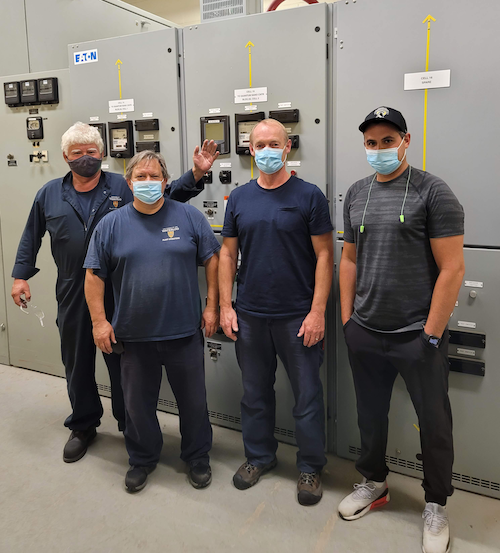Editor:
Brandon Sweet
University Communications
bulletin@uwaterloo.ca
President's Forum set for July 27

Members of the University community are invited to attend a virtual President's Forum on Tuesday, July 27. This virtual event is the latest iteration of ongoing series of president's town hall meetings and will use the Hopin platform as the forum is conducted partly virtually, and partly in-person.
Hear from President Vivek Goel and a panel of Waterloo experts as they provide an overview of the key public health factors that will support in-person experiences for students and employees.
Provost James Rush will give an operational update on the University’s plans for the fall and beyond, and Vice-President, Research and International Charmaine Dean will provide an overview of the impacts that the staged, safe return to campus will have for researchers at the University.
Marilyn Thompson, associate provost, human resources will moderate a Q&A session following the leaders' presentations. You are invited to submit questions when registering for the event, or you can ask them live on the Hopin platform.
The event takes place on Tuesday, July 27, from 1:00 p.m. to 2:30 p.m. on Hopin.
Register for the President's Forum.
Contact lenses that deliver far more than vision correction

By Melanie Scott. This article was originally published on Waterloo News.
Imagine reading a map or email on a head-up display right in front of your eyes — it sounds like something from a sci-fi novel, but it’s one of the many possible future uses for contact lenses that has been predicted through current and emerging research.

“People typically think of contact lenses as just another way of correcting poor vision and being an alternative to spectacles. However, over the past decade we have seen tremendous developments in the potential for contacts to detect eye and systemic disease, in addition to delivering drugs to manage these diseases,” says Lyndon Jones, lead author of the research paper Contact Lens Technologies of the Future, which compiles evidence pointing to the many current and future capabilities of contact lenses. “We already have electronic contacts that can screen for glaucoma, treat itchy eyes due to allergies and photochromic contacts to protect the wearer from bright lights.”
Jones, director of the Centre for Ocular Research & Education (CORE), is considered a top expert on contact lenses worldwide and has been awarded over 40 national and international awards related to contact lens research. His work has led to increased knowledge about the role of highly oxygen permeable soft lenses on ocular health, the interaction of tear film with contact lens materials and improvements in contact lens disinfection and cleaning systems.
Treating and diagnosing disease
Our tears contain a wide range of biomarkers that can help point to specific diseases. Biochemical tear film sensing technology and other sensing technologies, such as blink and eye-movement tracking, are rapidly evolving — paving the way for future diagnostic contact lenses. Current research, for example, looks at measuring tear film glucose for monitoring diabetes. Jones predicts that initially diagnostic contacts will be used to detect and monitor eye disease — there is already a contact lens available that can monitor eye pressure over extended periods of time in glaucoma — however based on rapidly evolving research, contact lenses could eventually diagnose other diseases such as cancer, hypertension or Alzheimer’s. These types of lenses would raise the potential for early detection, improving health outcomes for patients.
In Canada, we are on the verge of the release of the world’s first drug delivering contact lens, from Johnson & Johnson Vision, which will be used for itchy eyes caused by allergies. The potential for drug delivery contact lenses is immense because, compared to eye-drops, they offer a more controlled and accurate delivery of medication for treating ocular diseases, such as dry eye, glaucoma, infection and allergy.
Optical enhancements
Even now, there are many uses for contacts that go beyond standard vision correction, for example, some lenses are currently being used to control the progression of nearsightedness (myopia) in children, which means a lower prescription and ideally better ocular health outcomes in later life. Exploration of contact lenses that correct abnormal colour vision, which can impact many areas of modern life, is also underway.
Augmented reality technologies have allowed for digital vision enhancements that can be used to magnify objects or increase contrast for those with low vision. This is achieved by capturing real-time outward facing video, which is then projected on a micro-display in front of the eyes. Companies like Amazon and Facebook are already developing their own augmented vision devices in the form of smart glasses. Another company, Mojo Vision, is working on similar tech in the form of contact lenses. These products, which would first be used to help improve the mobility and independence of those with vision impairments, have yet to reach the market but with advancements in nanotechnology and miniaturization of electronics, their future seems promising.
“Novel biomaterials, nanotechnology progress, unique optical designs, biosensing discoveries, antibacterial surfaces and battery miniaturization and power transfer are coalescing like never before. The next several years will see incredible advancements and growth for an expanded contact lens category,” says Jones.
The trajectory of current research suggests that in time contact lenses could be the next consumer wearable smart device, used for entertainment, emails, social media and navigation. Their use in the diagnosis and management of both ocular and systemic disease will also increase over time, allowing for better patient health outcomes.
About CORE
CORE has a rich history as a leader and innovator in the field of ocular research. With over 50 researchers, support staff and trainees, CORE has strong roots in the School of Optometry & Vision Science at Waterloo and seeks to improve global eye health and vision through advanced bioscience, clinical research and education. For the last 32 years, it has been involved in some of the most meaningful advancements in the history of contact lenses, including the evolution of silicone hydrogel lenses and overnight lens wear, the development of disposable lenses and understanding dropout and dissatisfaction with lens wear. Many of the contact lens and dry eye products on the market today have undergone preliminary testing at CORE prior to regulatory approval and many more undergo later phase testing there once they reach the market.
Keeping the lights on and the power flowing

A message from Plant Operations.
As most of us enjoyed a relaxing summer weekend, the University campus was busy this Saturday. Our electrical trades and project management staff spent the day on campus.
Why? Our campus infrastructure is aging, and the High Voltage distribution cables we have relied upon for all these years require replacement. This weekend we connected 750 meters of High Voltage cable between our Central Plant, Federation Hall, and Village 1 as part of a multi-year cable replacement strategy. The entire north portion of the main campus was disconnected from normal power, and sensitive research was put on backup power to facilitate this work. In addition to our life safety and backup generators, many additional units were brought in to support campus research needs.
A similar power interruption to the South portion of the campus will take place on August 2. Historically, our main campus receives electrical power from two sources, but these are no longer enough to provide the power and redundancy we require. A third source will be connected during this interruption to provide room for future growth and additional redundancy.
Thank you to all the dedicated Plant Ops staff who worked feverishly along with the independent contractors from 5 a.m. until nearly midnight to ensure that the campus is back to safe operation on Sunday morning. Special thanks go out to our electrical and refrigeration teams (Stephen Braun, Ron Lopers, Wojciech Calujek, Jason Ballantyne, and Mike Greulich), who played a key role in ensuring this shutdown was successful.
Service Interruption subscription service affects some more than others. However, the notification system is available to everyone on campus. You can specify the buildings, type of service interruptions and change your preferences through a self-service subscription service.
Sign up to receive service interruption messages.
Thank you for your support and patience.
Link of the day
Checkmate: it's World Chess Day
When and Where to get support
Students can visit the Student Success Office online for supports including academic development, international student resources, leadership development, exchange and study abroad, and opportunities to get involved.
Instructors can visit the Keep Learning website to get support on adapting their teaching and learning plans for an online environment.
Course templates are available within your course in LEARN to help you build and edit your content and assignment pages quickly.
The following workshops, webinars, and events are offered by the KL team (CTE, CEL, ITMS, LIB):
- Independent Remote Course Design Essentials, self-directed, continuous self-enrollment course in LEARN.
Employees can access resources to help them work remotely, including managing University records and privacy of personal information. Here are some tips for staying healthy while working from home.
Stay informed about COVID cases on campus by consulting the COVID case tracker.
The Writing and Communication Centre has virtual services and programs to help undergrads, grad students, postdocs and faculty members with academic writing.
- Meet with writing advisors in one-to-one appointments to brainstorm, draft, revise, and polish. No time for an appointment? Try email tutoring for undergrads.
- Beat isolation and make writing progress at weekly Virtual Writing Cafés for grad students and faculty or PJ-Friendly Writing Groups for Undergrads.
- Take an online workshop or apply to our popular Dissertation Boot Camp program.
- Faculty can request custom in-class workshops for their courses, or the WCC can facilitate any existing workshops for student groups.
Co-op students can get help finding a job and find supports to successfully work remotely, develop new skills, access wellness and career information, and contact a co-op or career advisor.
The Centre for Career Action assists undergraduates, graduate students, postdocs, staff, faculty, and alumni through navigating career services that are right for them. You can attend a one-on-one appointment or same day drop-in session at the CCA for assistance with cover letter writing, career planning and much more. You can also book an appointment online or visit our Live Chat to connect with our Client Support Team. The CCA is here to help you.
If you feel overwhelmed or anxious and need to talk to somebody, please contact the University’s Campus Wellness services, either Health Services or Counselling Services. You can also contact the University's Centre for Mental Health Research and Treatment. Good2Talk is a post-secondary student helpline available to all students.
The Library continues to offer virtual access to learning and research materials as well as through their book pickup and delivery services. Davis Centre Library study space is open by appointment Monday to Friday from 9 a.m. to 5 p.m. Special Collections & Archives can also be accessed by appointment. Library staff are available for questions via Ask Us. Full details of current service offerings can be found on their Services Updates page. The Library has also published a resource guide on how to avoid information overload.
The Faculty Association of the University of Waterloo (FAUW) continues to advocate for its members. Check out the FAUW blog for more information.
The University of Waterloo Staff Association (UWSA) continues to advocate for its members. Check out the UWSA blog for more information.
The Indigenous Initiatives Office is a central hub that provides guidance, support, and resources to all Indigenous and non-Indigenous campus community members and oversees the university Indigenization strategy.
The Waterloo Indigenous Student Centre, based at St. Paul’s University College, provides support and resources for Indigenous students, and educational outreach programs for the broader community, including lectures, and events.
WUSA supports for students:
Peer support - MATES, Glow Centre, RAISE, Women’s Centre - Visit https://wusa.ca/peersupport to book an appointment
Bike Centre – Open via Appointments and Rentals
Campus Response Team, ICSN, Off Campus Community and Co-op Connection all available online. Check https://wusa.ca for more details.
Food Support Service food hampers are currently available from the Turnkey Desk on weekdays from 7:30 a.m. to 7:00 p.m. in the Student Life Centre. If you have any questions please email us at foodsupport@wusa.ca.
Centre for Academic Policy Support - CAPS is here to assist Waterloo undergraduates throughout their experience in navigating academic policy in the instances of filing petitions, grievances and appeals. Please contact them at caps@wusa.ca. More information is available.
WUSA Commissioners who can help in a variety of areas that students may be experiencing during this time:
- Equity – equity@wusa.ca
- Co-op and Experiential Affairs – coop.affairs@wusa.ca
WUSA Student Legal Protection Program- Seeking legal counsel can be intimidating, especially if it’s your first time facing a legal issue. The legal assistance helpline provides quick access to legal advice in any area of law, including criminal. Just call 1-833-202-4571.
Empower Me is a confidential mental health and wellness service that connects students with qualified counsellors 24/7. They can be reached at 1-833-628-5589.
When and Where (but mostly when)
Healthy Warriors at Home(Online Fitness)
NEW - Fitness Classes (CIF GYM 3). Power Yoga, HIIT and Zumba. Only $4/class. Advanced registration required.
NEW - Warrior Rec Open Recreation. During the week of July 19, the following spaces will start to be open for reservations: CIF Gym 1, CIF Gym 2, Field House, PAC Pool, Squash Courts and CIF Fitness Centre. Advanced Reservations required.
Warriors vs. Laurier Blood Donation Battle. Join your fellow Warriors, donate blood and help us win the Blood Battle against Laurier for a second year in a row. Set up a profile or add the PFL code: UNIV960995 to your account if you have a blood.ca account already. Questions? Contact WarriorsInfo@uwaterloo.ca.
Drop-in to Warrior Virtual Study Halls on Wednesdays from 5:30 p.m. to 7:00 p.m. Come together in this virtual space to set goals and work independently or in groups each week.
Warriors Custom Varsity Apparel. On sale July 7 to July 21. Show your Warriors pride with the line-up of customizable apparel including dry-fit tees, Nike Hyper Dry Hooded Long Sleeves and Nike Fleece Hoodies from W Store. Please note that this will be your only opportunity this year to purchase sport specific black and gold gear. Order today at www.gowarriorsgo.ca/customapparel
Renison English Language Institute continues to offer virtual events and workshops to help students practice their English language skills.
Renison/WPL Lecture series, Invisible Heartbreak: Personal Support Workers Share Their Front Line Experiences, Tuesday, July 20, 7:00 p.m.
CrySP Speaker Series on Privacy, "Digital fitness instead of blame and entrapment: re-framing "security awareness,"featuring Angela Sasse, Ruhr Universität Bochum, Friday, July 23, 11:00 a.m. Zoom link.
NEW - Warrior Rec Intramural Tournaments. Beach Volleyball, Saturday, July 24, Soccer, Saturday, July 24 and Sunday, July 25, and Ultimate Frisbee, Sunday, Sunday, July 25. Advanced Registration required.
UWSA Open Consultation Session - Updated MOA, Tuesday, July 27, 12 noon.